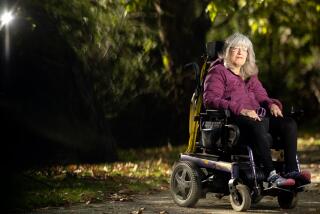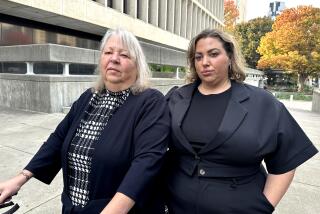Supporters of Ill Woman Take Protest to Insurer : Warner Center: The cancer patient’s friends demand that Health Net cover a bone marrow transplant. The firm calls it experimental.
Supporters of a 39-year-old woman dying from breast cancer staged a protest Friday outside the headquarters of her Woodland Hills health insurance company, which refuses to pay for a bone-marrow transplant that doctors say could extend her life but which the firm considers experimental.
Friends of Nelene Fox cheered as speakers demanded that Health Net, the state’s second largest health maintenance organization, “live up to its obligation to provide the coverage paid for” and “save this dear woman’s life.”
Supporters also announced at the Warner Center rally that they had raised more than $125,000, putting them within reach of the $150,000 required to begin the procedure at the Kenneth Norris Jr. Comprehensive Cancer Center at USC.
The full cost is expected to be $300,000, supporters said.
A Health Net spokesman declined to explain its refusal to pay for the treatment, citing state law protecting patients’ privacy.
A letter sent to the Foxes, however, said the firm “determined that the request for high-dose chemotherapy and autologous bone marrow transplant is considered investigational for the diagnosis of metastatic breast cancer.”
In a brief statement, the insurer, which has about 900,000 members, said: “ . . . if you knew all the facts in this case, you would appreciate that Health Net and the Medical Group have sought to act in the best interest of Mrs. Fox.”
In a declaration supporting a lawsuit that Fox and her husband, Jim, filed against Health Net on Friday in Riverside County Superior Court, Dr. Aziz Khan, a USC assistant professor of medicine, described Fox’s cancer as “aggressive” and said her life expectancy is “extremely limited and that high-dose chemotherapy and bone marrow rescue is the only option. . . .”
He recommended a regimen in which the patient’s bone marrow is removed and then reinserted after the patient is given high doses of cancer-killing chemicals.
The treatment has resulted in at least a short-term favorable response in 50% to 60% of patients, he said, and that 20% to 25% of “women with recurrent breast cancer treated with high-dose chemotherapy and stem-cell support are disease-free two or more years after treatment.”
Some patients “are now out seven to eight years following high-dose therapy without recurrence,” said Khan.
As new cancer treatments have proliferated in recent years, health insurers and doctors increasingly have clashed over whether the insurers should pay for the treatments, industry leaders say.
A Gallup survey co-sponsored by the National Cancer Institute last year found that half of 200 doctors questioned had problems providing their treatment of choice to patients because insurers refused to pay for the therapies.
Fox, who wept when speaking to about 45 supporters at the rally, said in an interview that she was convinced that Health Net refused to pay for the treatment because of its high cost.
She said she obtains Health Net coverage through her husband’s job as an eighth-grade English teacher at Temecula Middle School.
She said that in the year since her breast cancer was diagnosed, she has had both breasts removed and undergone months of chemotherapy, but that the cancer has continued to spread.
After Health Net refused to pay for the bone-marrow treatment, “I kind of lost hope,” Fox said. But the success of fund-raising efforts “gives me renewed hope of having a life to live with my husband and our three daughters.”
Mark Hiepler, Nelene Fox’s brother, said that contributions have come from 1,006 people, many of them, like the Foxes, members of First Lutheran Church congregations.
Hiepler, a Camarillo attorney, said that the suit against Health Net seeks a court declaration that the treatment is generally recognized in the medical profession, forcing Health Net to pay for it and also unspecified compensatory damages.
If Health Net ultimately pays for the treatment, “every dollar will be returned to donors,” Hiepler said.
More to Read
Sign up for Essential California
The most important California stories and recommendations in your inbox every morning.
You may occasionally receive promotional content from the Los Angeles Times.










